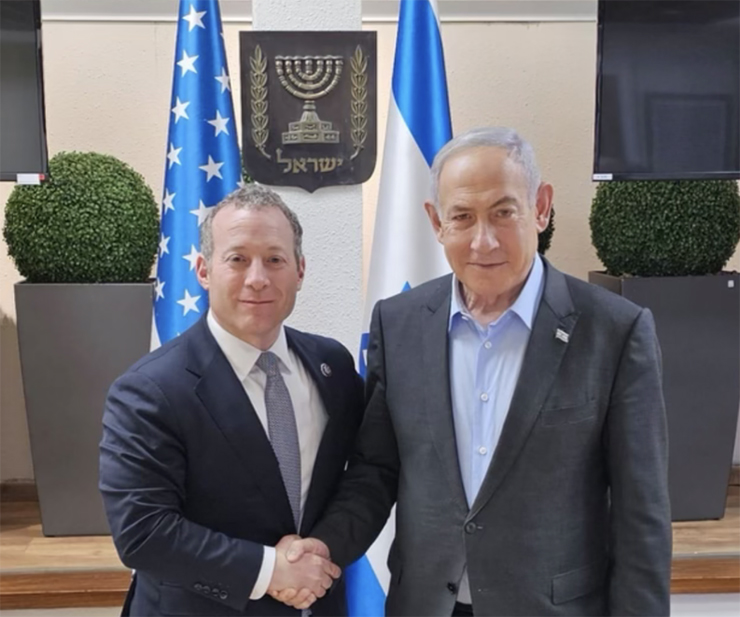
From December 17-21, a mission of 65 American business and tech executives visited Israel to extend their support to the business and tech sector of the economy, which is suffering from the war. They wanted to help the Israeli business leaders find ways to counter the war’s major economic disruption and come up with ideas to rebuild and support Israel’s tech industry.
David Siegel, the CEO of the global community platform Meetup, was a main initiator and coordinator of the mission. He worked with several others in America, including Ron Miasnik of Bain Capital Ventures, Elisha Tropper, founder and CEO of Jag Capital, and Joseph Katz, director of marketing and communications for JLIC, to put it together. Michael Eisenberg, of Aleph VC Fund in Jerusalem, was the coordinator from Israel.
“My son, who is in Israel, was barraged by friends calling from the U.S., asking what they could do to help Israel after October 7,” said Siegel. “He told me that he suggested that they understand who is in their direct sphere of impact, and focus on influencing those around them. He then told me that I should do the same. As a tech CEO, I know many tech and business leaders in the U.S., and decided that the most important thing I could do was to influence other influencers and leaders to ‘show up’ to Israel and ensure that Israelis understand that tech and business leaders will be there for them. We were able to get 65 tech, venture capital and business leaders to then drop everything and spend four to five days in Israel.”
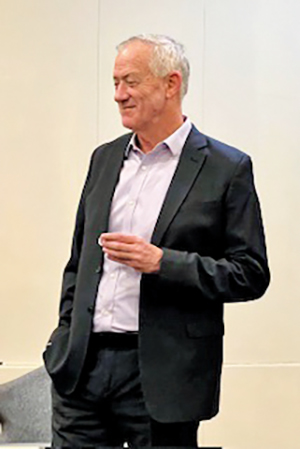
“It doesn’t matter to us whether the economic rebound takes three months, six months, nine months or 12 months,” Miasnik said. “We’re long-term bullish on Israel.”
Katz explained that there is an entire economic front to the war that isn’t getting much attention. Since approximately 15% of the tech workforce is serving in reserves, many Israeli tech companies are struggling. He said that the mission spoke to many business leaders and high-level government officials, who all expressed tremendous gratitude. “They have been feeling so alone.”
Tropper explained that the mission was the first to be oriented to business. Many rabbis and shuls have been coming, but this group of 65 people was composed mainly of secular Jews (and a few who are not Jewish at all). There were around 10 yarmulkes worn in the whole group. The Israelis were grateful to see that nonreligious people were part of the mix.
The many business leaders with whom the group spoke all shared the same idea: The war cannot end until Hamas is gone. They each emphasized the need to get the hostages back and remove Hamas from power. However, since tech companies often have young employees, they lost much of their staff to military reserves, which severely debilitated a crucial part of Israel’s economy. Tech companies account for over half of Israel’s exports and almost a fifth of its overall economic output.
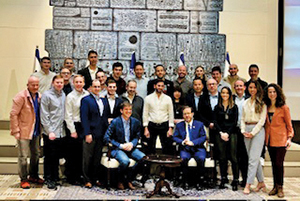
Still, the Israelis are working hard and remaining hopeful.
While meeting with tech leaders was the main goal, the parts of the trip that were most impactful to many members were meeting families who lost loved ones, both from terrorist attacks and active combat. “You can read about it in the papers and watch it on the news, but to hear it first hand—it’s so much more raw,” said Katz, describing one day when three grieving mothers spoke to the group. “Everyone was completely silent while they spoke. You could practically hear our hearts beating. We could feel their pain. Hopefully, we gave them some sort of comfort by being there.”
The group also went to the kibbutzim of Kfar Aza. “I already knew it was bad,” Katz said, “but when you walk through the area, your jaw drops to see the level of damage.”
Tropper added: “There were homes that were burnt down, and homes with hundreds of bullet holes in the walls. There was rubble everywhere and cars burnt down.” He described how there are now signs in front of each house with names of the people who had lived there. The group was deeply moved when they noticed the names of the families whose mothers had spoken to them just the day before. As they walked through the kibbutz, they were so close to Gaza that they could hear the explosions and the machine guns from inside the city.
Tropper talked about the strange dissonance of going from Kfar Aza, which was so devastating, to a beautiful and elaborate dinner in Kfar Shmaryahu, hosted by Barinboim Group founder Zvika Barinboim. But Tropper said that when members of the mission noted it, the reply was, “That’s Israel.”
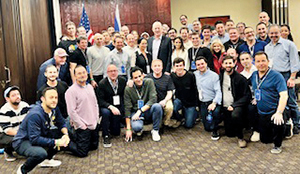
The group also went to the site of the Nova music festival where the massacre had taken place, which now displays posters with the photos and names of the people who were killed there. “They were clearly all young, happy people, whose lives were ahead of them, and just wanted to have a good time that night,” said Katz. Tropper added: “You could see that there was nowhere to go—it was in the middle of a large, flat, open field.” They visited the nearest bomb shelter, where many were killed.
Katz said that of all the politicians who spoke to them, he was most moved by Benny Gantz, Israel’s former deputy prime minister and current cabinet minister. Gantz’s main point was that the future will be good, and that now is the time to invest in Israel. He noted that whenever the country goes through a dire situation, there is a renewed sense of urgency, and ideas and entrepreneurship spring up—Israel always comes back stronger. Gantz also emphasized that with its tech innovations, Israel plays a vital role in the world economy. He concluded by saying that Israel is rediscovering itself, and is united like never before.
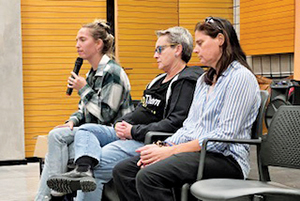
Another moving thought expressed by all the politicians was that Israel is very concerned with antisemitism around the world, especially in America. They are concerned for the American Jewish community, and feel that it’s their duty to help protect those in the Diaspora, though they are uncertain how. They watched the Congressional hearings about antisemitism on college campuses, and were furious with the responses of the Ivy League college presidents. They all shared the idea that it’s not Israeli Jewry and American Jewry anymore, but global Jewry.
The last day of the mission concluded with a discussion with President Herzog at the President’s house (beit hanasi). Herzog explained that he hopes more than anything that the Israeli people will hold on to the amazing achdut—unity—that they have achieved. Along that vein, Israeli politicians need to find a way to turn down the heat, and learn how to talk to each other instead of shouting at each other.

The mission members felt that they served a purpose by going to Israel, so much so that they want to work on enabling more missions like this; there are so many like-minded people who would love to help Israel if given the opportunity.
Siegel said: “I’m shocked with how optimistic I am. We know of Israeli resilience, but after seeing leader after leader—whether Knesset members or the head of the Tel Aviv Stock Exchange—share their deep belief in the unifying impact and the further ignition of the entrepreneurial drive, and then seeing the spirit of everyday Israelis who are out in mass numbers, filling the restaurants in cities—I am more optimistic in Israel 2.0 and the deep impact that October 7 can have in further developing Israel for the good.”










